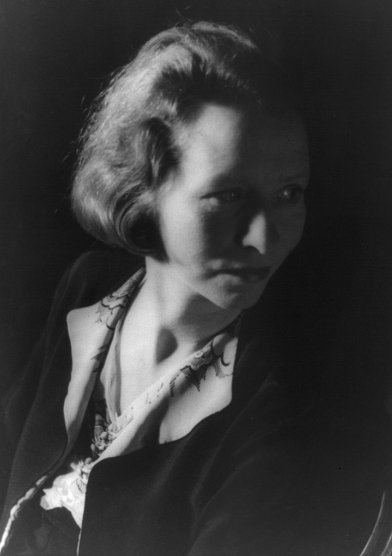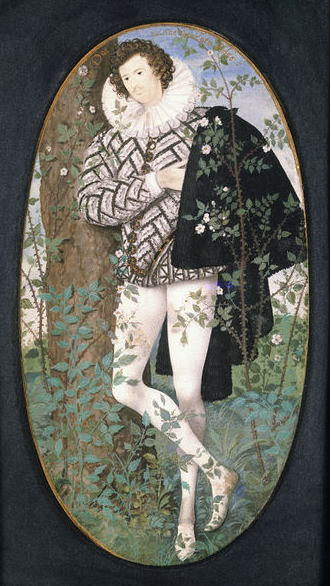February 2020
 In her own day Edna St. Vincent Millay was a Big Deal. She won the Pulitzer Prize for Poetry in 1923 at the age of 31, which is proof enough that she was a literary rock star. But 1923 is a long time ago and tastes change. The popularity of writers waxes and wanes and Millay’s fortunes waned even during her lifetime.
In her own day Edna St. Vincent Millay was a Big Deal. She won the Pulitzer Prize for Poetry in 1923 at the age of 31, which is proof enough that she was a literary rock star. But 1923 is a long time ago and tastes change. The popularity of writers waxes and wanes and Millay’s fortunes waned even during her lifetime.
It’s been donkey’s years since I became familiar with her work, not through any point of formal instruction but rather through fortunate serendipitous acquaintance. She’s been a good friend ever since. When I first read her work it astonished me and still does so. The quality of her voice would be notable even today if she used the forms and language of contemporary poetry. But I for one am glad she wrote when she did. Her language attaches to the poetic traditions of the 19th century and becomes under her touch beautifully concise and expressive in a way I can’t imagine being bettered by the linguistic modes we use today.
Recent articles about Millay focus on the eclipse of her poetry by her biography, which was heady for her day although relatively ho-hum for ours. I knew and loved her works for years before knowing anything about her life. Discovering the facts of the matter over the past few years has in no manner diminished my appreciation of her oeuvre. I don’t really know what all the fuss is about. Good poetry is good poetry no matter when it was written or how many people the author slept with. Whatever Millay’s biography may turn up the quality of her poetic output can’t be gainsaid. My purpose in this post is to give her a well-deserved shout out for the brilliant poet she was.

The temptation to link an artist’s work with his or her biography is always more tempting with writers than is the case with composers. Words tell tales much more readily and clearly than do notes of music, which probably goes a long way to explain why scholars don’t purport to find traces of J.S. Bach’s marital spats in his cantata arias. Searching for biographical influence in an author’s works is child’s play but has long been considered thoroughly low-brow in the academy. I suspect it nonetheless forms an element of the average reader’s reaction to any author’s oeuvre. It’s usually the case that strong personal experience finds its way into a poet’s work, is it not? To take some specific experience and elevate it to the level of human commonality — we’ll forego use of the term “universal” because it does indeed go beyond the pale — is a thoroughly admirable literary agenda, I think. I can point to many instances in Millay’s work where precisely that agenda has been in operation and worked a treat. Her sonnets especially come to mind in that regard. They arrested my attention from the moment I first read them and have been close friends ever since. They’re as good as Shakespeare’s IMHO despite the fact that they lack of the stamp of antiquity and occupy a considerable less exalted position in the literary canon.
I’ve always been more than happy to limit my consideration of an author’s biography to what shows itself in his or her writing. The reason is simple: if the oeuvre requires for its comprehension knowledge of the author’s biography then something is amiss with the works themselves. That works are grounded in personal experience — i.e. biography — is one thing, but I don’t find that biographical and literary trajectories are equivalent across the board. The poetry of even so autobiographical an author as Anne Sexton, another favorite of mine and as different from Millay as chalk is from cheese, can’t be reduced to simple biography. Human beings are far too complex as creatures and as consciousnesses to be thus reducible. But without some link between biography and written work it seems difficult to imagine how an author could speak with as strongly personal and incisive a voice as Millay or Sexton speak. I would miss that element in both authors were it not present. Thank goodness it is.
Millay shocked people in her day by her frankness about sexuality. If we follow the biographical trail then of course we end up at the doorstep of her bisexuality and the fact that she was wont to “put it about” as the English so winsomely phrase it. When I first read her sonnets I was taken aback, as well — pleasantly so, I hasten to add. I thought to myself, “Finally, somebody’s spilling the beans without beating around the bloody bush. How refreshing!” Since I happen not to be of the female persuasion my reaction can’t possibly be credited to an upsurge of recognition for the experience of a member of my own sex. It must be ascribed to a felt recognition of personal authenticity that transcends gender and applies to humans in general regardless what they happen to have between their legs. That Millay is a woman certainly figures into the picture, but her expression is human. It’s also a perfect example what I call her “fiery filigree,” the delicate and artful expression of emotion that by its own nature is as raw as a T-bone stake before it hits the grill. Take these two sonnets as examples:
I, too, beneath your moon, almighty Sex,
Go forth at nightfall crying like a cat,
Leaving the lofty tower I laboured at
For birds to foul and boys and girls to vex
With tittering chalk; and you, and the long necks
Of neighbours sitting where their mothers sat
Are well aware of shadowy this and that
In me, that’s neither noble nor complex.
Such as I am, however, I have brought
To what it is, this tower; it is my own;
Though it was reared To Beauty, it was wrought
From what I had to build with: honest bone
Is there, and anguish; pride; and burning thought;
And lust is there, and nights not spent alone.I, being born a woman and distressed
By all the needs and notions of my kind,
Am urged by your propinquity to find
Your person fair, and feel a certain zest
To bear your body’s weight upon my breast:
So subtly is the fume of life designed,
To clarify the pulse and cloud the mind,
And leave me once again undone, possessed.
Think not for this, however, the poor treason
Of my stout blood against my staggering brain,
I shall remember you with love, or season
My scorn with pity,—let me make it plain:
I find this frenzy insufficient reason
For conversation when we meet again.
Wow. Knock me over with a feather … The historical point at which these sonnets appeared was not a time when women were wont to reveal pressure from biological imperatives from which members of the female sex were still in large part believed (or rather, expected) to be exempt. Please note as well that the core phenomenon is conveyed without the use of any words of four letters beginning with F. I doubt that trick could be pulled off these days. 🙂 The emotion is indeed raw, the expression consummately refined. That’s the way with Millay’s fiery filigree.
I’ve read in articles on Millay that her espousal of political topics caused her reputation to wane during her lifetime. That was long before the days of Allen Ginsburg and Howl, when poetry was still considered either decorative or above such temporal concerns as waging war or committing genocide. If her political poems caused her star to droop in the public’s opinion, then bless her all the more for sticking to her guns. Her poems on war, on the execution of Sacco and Vanzetti and all the other political things she wrote are fantastic. I can still remember the shock of recognition when as a young adult I came across this poem of hers:
Apostrophe To Man
(On reflecting that the world
is ready to go to war again)Detestable race, continue to expunge yourself, die out.
Breed faster, crowd, encroach, sing hymns, build bombing airplanes;
Make speeches, unveil statues, issue bonds, parade;
Convert again into explosives the bewildered ammonia
and the distracted cellulose;
Convert again into putrescent matter drawing flies
The hopeful bodies of the young; exhort,
Pray, pull long faces, be earnest,
be all but overcome, be photographed;
Confer, perfect your formulae, commercialize
Bacteria harmful to human tissue,
Put death on the market;
Breed, crowd, encroach,
expand, expunge yourself, die out,
Homo called sapiens.
I’ve found myself thinking exactly the same thing as I hear more and more about irreversible climate change. For a woman to have published such a poem before 1950 is extraordinary. Hats off to her. If any damage was done to her reputation as a result of such works the fault lies with the public, not with the poet. The poetry is superb.
It’s certainly the case that the public had become used to a lighter Millay, the personality without much gravitas reflected in such charming fripperies as these:
Grown-Up
Was it for this I uttered prayers,
And sobbed and cursed and kicked the stairs,
That now, domestic as a plate,
I should retire at half-past eight?Second Fig
Safe upon the solid rock the ugly houses stand:
Come and see my shining palace built upon the sand!
I appreciate the entire range of voice and experience Millay shows in her work. Why should a poet not be various, since we are that way ourselves in life? I appreciate equally the different formal registers she uses in the oeuvre. I’m exceedingly fond of a good Petrarchan sonnet — what’s not to like? It’s the espresso of the poetical domain — you get all the flavor and the caffeine in a small cup that packs a punch. Perfect! There are poets for whom the sonnet form offers a natively comfortable vehicle for thought and clearly Millay was one of them. Sonnets flow from her with the ease of fragrance from a bottle of scent. The thoughts concatenate so seamlessly that despite the rhyme scheme they have the naturalness of conversational speech. Here is a special favorite of mine:
His stalk the dark delphinium
Unthorned into the tending hand
Releases . . . yet that hour will come . . .
And must, in such a spiny land.
The silky, powdery mignonette
Before these gathering dews are gone
May pierce me — does the rose regret
The day she did her armour on?
In that the foul supplants the fair,
The coarse defeats the twice-refined,
Is food for thought, but not despair:
All will be easier when the mind
To meet the brutal age has grown
An iron cortex of its own.
In this sonnet the mind must make more of an effort to follow in the octave, to close the gaps opened by the ellipses. The basic thought is clear enough but the reader must assemble the details into a coherence forged from his or her own understanding, from images that coalesce but are not gravitationally bound by their inherent linguistic value. To be perfectly honest I don’t bother to get to that particular homework assignment until after wallowing in the imagery for a while, sybaritically and without any apology. “His stalk the dark delphinium …” Ooh lovely, my mind goes afloat at the end of that line imagining this dark delphinium. It’s one of the dark blue ones that looks like larkspur, I wager, like these:

And no doubt the he who does the holding is as comely a creature as the Tudor dish whom the painter Nicholas Hilliard put among a splash of roses:

“Unthorned into the tending hand …” That line sets the flowers and the he holding them in motion, in a gesture of such gentleness and sweetness that it’s too great a temptation to resist dwelling with it a while. It’s so easy to imagine our young Tudor hunk handing over a stalk of that beautiful blue delphinium into the open hand of someone smiling at him as the flowers touch the fingers. In two lines we have an idyll outside time in full flush in the imagination, without any referent to the present and its thorny bits. All is handsomeness and ease. Then come the dots …
I find the tenuousness of the ellipses the perfect touch for the octave, which in classical Petrarchan sonnet form is supposed to present a problem or dilemma which the sestet then resolves. “… and yet that hour must come …” It’s no wonder I dawdle on the images before the dots, because once the dots show up things go downhill fast. By the time I get to the “silky, powdery mignonette” I’m already back in the cold light of day and haven’t much interest in exerting the effort to flesh out the mignonette in my imagination. Come to think of it, I don’t even know what a mignonette is LOL. I can’t be bothered to Google it because it’s gonna be toast anyway by the look of things. Why knock myself out? Roses wearing armor puts us squarely back in the dog-eat-dog reality we inhabit. The party is over.
The sestet abruptly shifts the voice register to no-nonsense practicality. Its message is basically: get over it. It also contains the “gird your loins” notion in the last two lines. The Tudor hunk is but a fantasy and the dark delphiniums, while as real as you or me, turn out to be just flowers, not harbingers of some rapturous reality set to envelope us like a heady perfume.
Millay’s use of the phrase “the brutal age” is perfectly justified because the world in the 1930’s was indeed brutal. Just think of the period — the stock market crash of 1929 and then World War II. The hoorahs I’ve lived through have happened with few exceptions outside my own back yard. Things looked dicey when the oil embargo in 1973 made us queue up for gas at the pumps, but we carried on with nary a hair out of place. It’s hardly on a par with stock markets crashing around the world, financiers jumping out of windows to their deaths, or the rise to power of Hitler. Even America’s current dalliance with Fascism seems amateurish and risible in comparison to what happened in Europe in the 1930’s. So Millay was perfectly justified to call her age brutal. It was exactly that, and in spades.
At the end of the day, then, Millay shows herself to be anything but the dreamy, femmy thing she seemed in the very early works. Even if she were less fine a craftsman I’d still find her work arresting for the thoughts expressed. She’s not only a poetic voice of the highest order, she’s a witness of and testifier to the maladies of her age. Some of the trenchant thoughts she expresses suit situations we face today. For that reason I find in her work companionship that comforts me. Somebody else has seen similar things and had similar thoughts. That experiential companionship means a great deal to me and is the reason Millay’s work has accompanied me across the length and breadth of my adult lifetime.
Recent research I did on Millay turned up an article in The Guardian by Amandas Ong entitled “Edna St Vincent Millay’s poetry has been eclipsed by her personal life ? let’s change that,” published in February of 2018 (article here). The last paragraph hints at some of the sticky wickets Millay fell foul of in her last years:
I Know I Am But Summer to Your Heart presumably describes unrequited feelings for another, although it takes on a different meaning when one thinks about Millay’s fall from grace towards the end of her life; she became ostracised by the literary community for her attempts at political poetry. Unlike other famed poets such as Siegfried Sassoon who were vociferous about the carnage and destruction of war, Millay collaborated directly with the Writers’ War Board for poetry that championed the allied forces. This, together with her spiral into drunkenness and drug addiction, spelt the end of her time in the limelight, although she never stopped writing. A revival of serious interest in her poetry is in order. And for those still obsessed with the details of her colourful life – well, they can find as much richness and more in her luminous work.
The “spiral into drunkenness and drug addiction” has far less to do with gnarly psychology than with the physical consequences of an automobile accident that left Millay in constant pain. Morphine was the analgesic of the moment — it was too early for oxycodone. But throughout most of her adult life she lived and worked on a farm — Steepletop in Austerlitz, New York, the place where she died. She had animals and grew both vegetables and flowers. Compared to poets like Arthur Rimbaud or Paul Verlaine she looks like Betty Crocker despite the booze and the opium derivatives. I’ve never for a moment found that her biographical details do anything but increase my appreciation for her works. The work simply shows that she was capable of getting her poetry written despite odds that would have silenced others.
The eclipse of her reputation and the relatively obscurity in which her work languishes today are both signals of problems with the audience, not the poet. Americans have never been very keen on poetry — unless it happens to occur on the inside of a Hallmark card, that is. It comes as no surprise to me that poets I consider among the major figures of American literature — Millay, Anne Sexton, Wallace Stevens, to name just a few — are all but invisible today. How many people under the age of 30 would even know who Walt Whitman is, let alone Millay? So any eclipse of reputation says nothing about the poet and the quality of the work. It just shows us Americans for the trailer-court creatures we are when it comes to litrachoor.
There’s nothing I can do to change that state of affairs, of course, but that doesn’t stop me from shaking my finger at it like Nancy Pelosi. Better to do that than succumb to sadness that Millay’s fabulous work goes unappreciated today. It deserves to be praised to the rafters. She had something important to say to her own times, she speaks to ours as well, and the intelligence and elegance with which she crafted her expressions of thought continually delight me as I revisit them. So to a poet who should by right figure among our National Treasures I say: Good on ya, Edna. You nailed it. I’ll be reading you until I kick the bucket and whoever it is who has to go through my stuff will find your books. May they find another person in future who loves them as much as I do.

